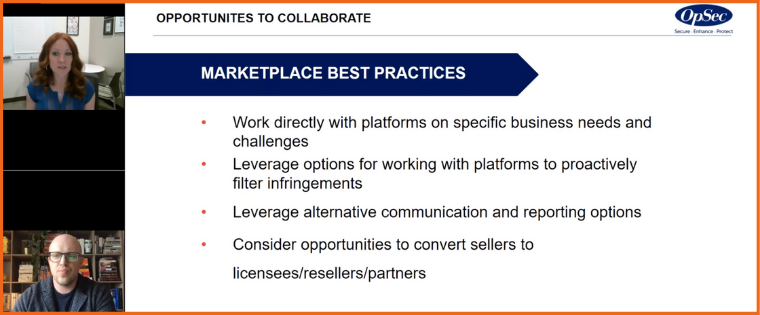
Webinar: Maker Marketplaces are Tricky Terrain for IP Enforecement
As they scout maker marketplaces in search of IP violations, brand owners need to carefully walk a line between stopping volume infringers and working with smaller scale fan/creators who in some cases may be operating legally under Fair Use doctrine.
During the webinar, “Strategies for Dealing with Infringements in Maker Marketplaces” Nancy Merritt, Senior Manager of Global Relationships at OpSec Online, and Matthew Winterroth, Inhouse Counsel and VP Intellectual Property at World Wrestling Entertainment (WWE), laid out the legal and commercial challenges posed specifically by those who sell through marketplaces such as Etsy, Redbubble and others, as well as via social commerce on Instagram, Facebook and other platforms. The Licensing International Webinar Series is sponsored by OpSec Security.
Among tips for brand owners:
- Contact the infringers directly, and work with the platforms to take products down. This can be through a cease-and-desist letter, phone call or email. “Look for options to reach out and work with them and give them the opportunity to learn about your business and brand and what your needs and challenges are,” said Merritt.
Added Winterroth: “Every time I craft a cease-and-desist letter…, I think about PR repercussions. How will this come back to potentially haunt me and my company. You want to come off not as the Goliath, but take a bit of a softer approach” if possible. - Consider converting the infringers to licensees. “Sometimes these may be a very small group within the large scheme of things, but if you find a seller who is a huge fan of your product or brand and they are creating something unique you might want to make them a licensee,” says Merritt. “You don’t want to reward bad behavior, but if they are in a group of loyal fans and have a certain niche and skills, it might be worth considering.”
They might be selling something that could help expand a brand’s program. For example, WWE reached an agreement with writer/artist Rob Schamburger that brought his WWE-related work into the company’s online shop and expanded him into new categories, says Winterroth. - Work with organizations dedicated to IP enforcement. “For a young brand it is important to be part of organizations and meet IP enforcement people from other companies,” says Winterroth. “Some of these companies may be competitors, but everybody is facing the same problem.” There are also several companies devoted specifically to discovering, tracking and eliminating infringers on multiple platforms.
- Be selective in enforcement; focus on serial infringers, and those who are manufacturing in bulk. Also, said Winterroth, keep an eye out for print-on-demand manufacturers who pop up on social platforms “and appear and disappear in a couple of hours” to leverage an instantly hot meme or catchphrase from that night’s episode.
- Educate people within your own organization. “You really need as a company to understand fair use laws and the concepts,” says Winterroth. “You have to realize that there are going to be people selling merchandise in a fair use manner with your IP that’s promoting your brand and not using it in a damaging or infringing way.”
If you’re a member of Licensing International, you can access the complete webinar here.
The next edition of the Licensing International Webinar Series is next Tuesday, April 7, when the topic is “Creative Solutions to Licensing Issues Caused by Coronavirus,” presented by Steven Heller, Founder of The Brand Liaison.

















